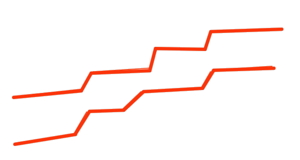Back in December, when I reviewed Cyrus Dunham's *A Year Without a Name*, I noted the author's fleeting worry that an ambivalent attitude towards the identity he transitioned to could be seized upon by transphobes as proof that this whole transgender thing is being embraced by people who might get buyer's remorse and reject it all later.
Torrey Peters takes it to the next level and wades headlong into it, giving us a character who has, in fact, detransitioned. It's not a screed against the danger of having a transgender identity available as an option, but rather instead another novel that upends the neat little identity-boxes and the oversimplifications.
Amy/Ames, the detransitioned character, has not abandoned their she-identity because it did not fit, but because it fit a little too well, opening up an enticing menu of desired options and outcomes that left her as Amy too vulnerable in a world where vulnerability is a liability. The extra social cost of being trans, on top of the interpersonal emotional price tags of being a woman in this society, was too much, and if the response was to close down, to deny one's feelings and be as oblivious to them as possible, why not go the whole way and retreat back into being one of the guys?
Amy/Ames' former lesbian partner, Reese, is the second of the three primary characters. Reese, unlike Amy/Ames, has not detransitioned and is still coping with life as a trans woman. She, too, finds fulfillment and connection an ongoing challenge but she's in it for the long haul, and resents Ames for abandoning her.
Katrina is Ames' boss, and his current lover, and at the book's opening she does not know that Ames lived as a transgender woman. Ames has assumed the female hormones taken during that time ensured sterility. Incorrectly, as it turns out: Katrina is pregnant.
The premise of the book is that Ames is totally not ready to occupy a social and psychological role as a male parent, feeling utterly like a fake man. Reese and Amy had been planning to adopt before they broke up, and Ames comes up with the solution that the three of them jointly should raise this baby.
Katrina is gender-nonconforming in various ways herself. She tops Ames in a BDSM-flavored dynamic and has never felt as ease in the conventional woman role. This is her second pregnancy; she was married, became pregnant, and miscarried, and to her horror realized she was glad because it gave her an excuse to break up the marriage and escape from the projected identity-assumptions of all their married-couple friends.
A significant amount of the story is told as backstory, filled in in flashbacks: we see Reese as a boy, pre-transition, at the ice skating rink, skating with the girls who are his friends, wanting to blend in with them, resenting it when they're all taken to MacDonald's afterwards and he alone gets a boy toy with the Happy Meal. We get to review the Amy-Reese breakup in slow motion, with Amy being distant and unresponsive and Reese pursuing an affair with Stanley, who in one pivotal scene calls Reese and Amy "queers" and fights Amy in a sidewalk brawl. We're shown the attenuated communication between Amy and Reese that led up to Reese turning to outside connections for her emotional needs.
It's neither just an edgy new sitcom nor a feel-good tossed-salad of spectacularly nontraditional identities. There's a sharp edge to the ending, which flings the three of them hurtfully against each other and remains unresolved. So it's a reminder that we continue to hurt each other in our neediness and desperation, and are only now in the process of forging a way forward more united than adversarial and resentful.
—————
My first book, GenderQueer: A Story From a Different Closet, is published by Sunstone Press. It is available on Amazon and Barnes & Noble in paperback, hardback, and ebook, and as ebook only from Apple, Kobo, and directly from Sunstone Press themselves.
My second book, That Guy in Our Women's Studies Class, has also now been published by Sunstone Press. It's a sequel to GenderQueer. It is available on Amazon and on Barnes & Noble in paperback and ebook, and as ebook only from Apple, Kobo, and directly from Sunstone Press themselves.
I have started querying my third book, Within the Box, and I'm still seeking advance readers for reviews and feedback. It is set in a psychiatric/rehab facility and is focused on self-determination and identity. Chronologically, it fits between the events in GenderQueer and those described in Guy in Women's Studies; unlike the other two, it is narrowly focused on events in a one-month timeframe and is more of a suspense thriller, although like the other two is also a nonfiction memoir. Contact me if you're interested.
Links to published reviews and comments are listed on my Home Page, for both published books.
———————
This DreamWidth blog is echoed on LiveJournal and WordPress. Please friend/link me from any of those environments on which you have an account.
————————
Index of all Blog Posts
Torrey Peters takes it to the next level and wades headlong into it, giving us a character who has, in fact, detransitioned. It's not a screed against the danger of having a transgender identity available as an option, but rather instead another novel that upends the neat little identity-boxes and the oversimplifications.
Amy/Ames, the detransitioned character, has not abandoned their she-identity because it did not fit, but because it fit a little too well, opening up an enticing menu of desired options and outcomes that left her as Amy too vulnerable in a world where vulnerability is a liability. The extra social cost of being trans, on top of the interpersonal emotional price tags of being a woman in this society, was too much, and if the response was to close down, to deny one's feelings and be as oblivious to them as possible, why not go the whole way and retreat back into being one of the guys?
Amy/Ames' former lesbian partner, Reese, is the second of the three primary characters. Reese, unlike Amy/Ames, has not detransitioned and is still coping with life as a trans woman. She, too, finds fulfillment and connection an ongoing challenge but she's in it for the long haul, and resents Ames for abandoning her.
Katrina is Ames' boss, and his current lover, and at the book's opening she does not know that Ames lived as a transgender woman. Ames has assumed the female hormones taken during that time ensured sterility. Incorrectly, as it turns out: Katrina is pregnant.
The premise of the book is that Ames is totally not ready to occupy a social and psychological role as a male parent, feeling utterly like a fake man. Reese and Amy had been planning to adopt before they broke up, and Ames comes up with the solution that the three of them jointly should raise this baby.
Katrina is gender-nonconforming in various ways herself. She tops Ames in a BDSM-flavored dynamic and has never felt as ease in the conventional woman role. This is her second pregnancy; she was married, became pregnant, and miscarried, and to her horror realized she was glad because it gave her an excuse to break up the marriage and escape from the projected identity-assumptions of all their married-couple friends.
A significant amount of the story is told as backstory, filled in in flashbacks: we see Reese as a boy, pre-transition, at the ice skating rink, skating with the girls who are his friends, wanting to blend in with them, resenting it when they're all taken to MacDonald's afterwards and he alone gets a boy toy with the Happy Meal. We get to review the Amy-Reese breakup in slow motion, with Amy being distant and unresponsive and Reese pursuing an affair with Stanley, who in one pivotal scene calls Reese and Amy "queers" and fights Amy in a sidewalk brawl. We're shown the attenuated communication between Amy and Reese that led up to Reese turning to outside connections for her emotional needs.
It's neither just an edgy new sitcom nor a feel-good tossed-salad of spectacularly nontraditional identities. There's a sharp edge to the ending, which flings the three of them hurtfully against each other and remains unresolved. So it's a reminder that we continue to hurt each other in our neediness and desperation, and are only now in the process of forging a way forward more united than adversarial and resentful.
—————
My first book, GenderQueer: A Story From a Different Closet, is published by Sunstone Press. It is available on Amazon and Barnes & Noble in paperback, hardback, and ebook, and as ebook only from Apple, Kobo, and directly from Sunstone Press themselves.
My second book, That Guy in Our Women's Studies Class, has also now been published by Sunstone Press. It's a sequel to GenderQueer. It is available on Amazon and on Barnes & Noble in paperback and ebook, and as ebook only from Apple, Kobo, and directly from Sunstone Press themselves.
I have started querying my third book, Within the Box, and I'm still seeking advance readers for reviews and feedback. It is set in a psychiatric/rehab facility and is focused on self-determination and identity. Chronologically, it fits between the events in GenderQueer and those described in Guy in Women's Studies; unlike the other two, it is narrowly focused on events in a one-month timeframe and is more of a suspense thriller, although like the other two is also a nonfiction memoir. Contact me if you're interested.
Links to published reviews and comments are listed on my Home Page, for both published books.
———————
This DreamWidth blog is echoed on LiveJournal and WordPress. Please friend/link me from any of those environments on which you have an account.
————————
Index of all Blog Posts



